I, along with many others, I’m sure, have often wondered, What would I have done if I were there? I was born in the U.S. just after WWII, but what if I’d been German living in Germany during the Holocaust. What would I have done?
Would I have kept my head down, gone on with my little life, ignoring the signs, the rumors, the fumes? Would I have naively trusted the authorities – political and religious – believing they knew best? Would I have gone along to get along, not wishing to stick my neck out, raise my voice, step out of the secure circle of my small, cherished community? Would I have clung to my known and comfortable life path out of, what? Fear? Apathy? Lethargy?
I like to think not.
I am half German. My mother’s parents were German immigrants to the United States, and my father’s parents were from Scotland. Although my mother’s family had nothing to do with the Holocaust, having emigrated from Germany before the First World War and they soon stopped speaking German and completely acclimated themselves to the American way of life, I’ve always been ashamed of that half of me. How could I be even remotely related to such a cold and heartless people who allowed the Holocaust to happen?
All my life, as is my want, I’ve searched for answers to these questions, in books and films (such as “Schindler’s List” and “The Boy in the Striped Pajamas”), as well as in true personal stories. I’ve longed to be inspired by stories of heroism, such as this story my French friend Marie-Laure told me about her father:
During WWII he was a policeman in Paris, and his beat was the 16th Arrondissement, which included countless elegant apartment buildings owned by Jews. When he became aware that Jews in the city were being rounded up and sent away, he quietly and privately warned the Jewish landlords whom he knew of the dangers they faced. Many of them fled to safety with their families and friends before they could be captured. In providing this warning, Marie-Laure’s father alone, a Catholic man in his early twenties, saved perhaps hundreds of French Jews’ lives.
And books. One book in particular stands out: Stones from the River, by Ursula Hegi, published in 1997. This novel opened my eyes to small-town life in Germany during that war. The lesson I learned from this powerful book about one small person’s heroism stuck with me for years (and I’m now rereading this gripping story):
Trudi Montag and her father, a widower, own and run a bookstore in the German town of Burgdorf. Trudi is indeed a small person; she is a Zwerg – a dwarf – so she knows discrimination first-hand. Her loving and tender father, however, teaches her that the most important thing in life is to be kind. It is here, in the cellar of their home, beneath the bookstore, that father and daughter harbor their Jewish neighbors to save their lives.
Today there is a new war raging, with a new genocide in the making. I ask myself, What can I do? I know I cannot ignore it. I cannot turn away from it. Yes, it’s far away, in the Middle East, on the other side of the world. But my country is supporting it – aiding and abetting it – so it is in fact close to home for me. I cannot be apathetic. I believe apathy is complicity.
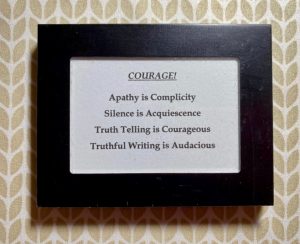
Speaking for myself, I’ve decided I must learn as much as I can – pay attention to truthful speakers, read trusted news sources and good books – and then share what I learn wherever and however I am able.
As a writer, I consider myself a messenger. So, for example, if I see a video of an old, white-haired-and-bearded rabbi crying out from his heart about the horrors of this genocide – “This is NOT who we are as Jews! This is not what the Torah teaches!” – I hear the truth of his words and consider it my job to share his message as widely as possible.
As a teacher (still, at heart), I must press meaningful reading matter on whomever I can reach. This book especially, which I just finished reading, is a must for anyone interested in this current war: The Hundred Years’ War on Palestine, by Rashid Khalidi, published in 2020. This brilliant book, a New York Times bestseller, which was recommended to me by a Jewish friend, is not an easy or quick read. But it is well worth the time and effort. It puts things in perspective. It answers questions and even offers some hope.
As an American citizen, I’ve written to President Biden to let him know my stance. Will he read it? Will it matter? Doubtful. But I still have a voice, and I’m still free to use it. The U.S. is still a democracy, isn’t it?
As an older, single woman, I no longer care what people think of what I say or write or do. That’s one of the many beauties of this age and stage of life. I cannot lose my job by speaking out, because I’m retired from the workforce and nobody pays me to write or speak. I cannot upset my husband by taking a radical stand, because I don’t have a husband to tell me how to live. I am free to be me now, and I’m thankful for that. I have “nothing left to lose,” as Janis Joplin used to sing.
Two weeks ago, on New Year’s day, I woke before dawn to watch the sun rise on this new year. I took a photo of that dramatic sunrise, and I wrote this quasi-poem to express how I felt in that moment:
If enough of us who ache for peace
put more pressure on the Powers that Be
while we still have a voice (Democracy?),
perhaps, just perhaps,
we might see peace in this new year.
We need not be passive observers
to this ongoing horror show,
as if it were a dream we couldn’t wake from.
We must wake up, get up,
and put our shoes on.
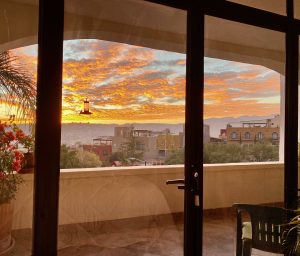
For me, the worst thing I could do now would be to turn away, cover my eyes, ears, and mouth (“See no evil, hear no evil, speak no evil”) because it’s all so upsetting and unpleasant, and be like those Germans during the Holocaust who did nothing – to their eternal shame.
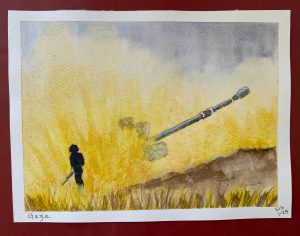

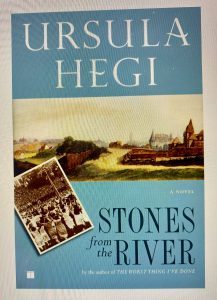
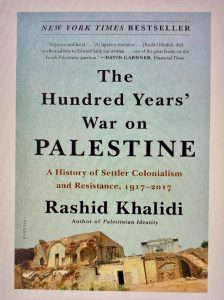
Multiply enough small voices and we have a roar
The Politics Girl podcast offers a great explanation about the current conflict
Hugs to you Bonnie
Thank you, dearest Arti! Yes, it’s time for all of us to join our voices in a ROAR. — xx
Thank you again for your thoughts and book suggestions. Have you read Naomi Klein’s Dopplegager? More insights.
You’re welcome, Heather. I’m happy to share. No, I haven’t read this Naomi Klein book, but I’ll add it to my list!
As an American Jew living in San Miguel I, too, look on with disgust at Netanyahu’s bombardment of Gaza. You probably realize that the vast majority of American Jewry despise this Israeli rightwing government, as well as Netanyahu’s past treatment of our previous president, Obama. We, like the Biden administration, see a two State solution as the only path forward. And yet, please don’t forget the relatively recent history of my /our grandparents generation of European Jewry who were almost entirely eliminated. This is the root cause of Israeli existential fear.
Yes, Ronald, I agree. Netanyahu is doing great harm, I feel, to Jews all over the world. There is no justification for genocide.
There is no justification for genocide, period. I would commend to other readers the editorials by Tom Friedman ( NYT) who has offered sane, compassionate and practical advice for achieving a two State solution.
Thank you, Ron.
Thank you. This is such a horror! Biden has played it poorly. The one thing that disappoints me most about his administration. Hope it doesn’t cost him the election.
Yes, Scott, a “horror.” I, too, am disappointed in Biden. It’s all so heartbreaking.
Thank you for reminding me to probe/question/interview every political candidate in my voting district about international issues as well as our own backyard.
Yes, Marie, we all can do something. Thank you for doing your part. — BB
Wow, brilliant essay…..no more silence….we all have a responsibility to do our part to stop the slaughter in Gaza. I posted this piece on my facebook page.
Thank you, dear Kathleen. Yes, we all need to raise our voices now. Thank you for reposting. — xx
….and the one thing we all can do is VOTE! Trump is the evil we must fear, he who glorifies all other evil, BB, Putin and too many more.
Explain all this to those who deny, to those who maybe bigots or worse. They may well not have a change of “heart” but maybe just maybe with the collective …we must act in the here and now!
My grandmother was a survivor, I never knew what camp nor her horror stories some of which she may have told my grandfather about, always quiet, always sharing what tenderness she could, her wish to be strong enuf even thru her tears. I was too young then to understand, but now that I do….speak up speak out!
Thanks, Alan.
Beautiful Bonnie, thank you!
Thank you, querida Kim.
Beautiful poem, Bonnie! Thanks for sharing all this.
Thank you, Te!
Thank you Bonnie. This is given me a lot to think about. Instead of just feeling helpless watching all of this unfold, I have to find a way to take some action.
Thank you for this, dear Victoria. Yes, that’s what I’m hoping more of us (who are awake and alert and wearing our shoes!) will do — while we still have time. — BB
I am keeping tuned to Al Jazeera t.v. for in-depth reporting on the war. It is hard to understand why Biden is letting this go on for so long. And where are Dr. Jill and V.P. Kamala on this? How can they silently watch the killing of all these innocent women and children and do nothing? Have they no influence???
So true, Ruth. Thank you for pointing this out. I have no doubt that if the Obamas were still in the White House, Michelle would be speaking up…. I wish I could get Al Jazeera on my TV. Maybe I can find it online. But I, too, have been going to solid sources for reliable news reports and doing my best to stay informed.
Israel, Palestine, Iran, Russia, Ukraine, China, Taiwan, North Korea. There is a high level of unrest and warfare and human atrocities being committed worldwide. Maybe more to come from other areas too. My cousin in Greece is terrified Turkey will see the Hamas diversion as an opportunity to make a move. Women in Afghanistan must feel imprisoned under Taliban rule, unable to work, their husbands dead from previous warfare, world aid abandoning them and left to watch their children starve.
I am ashamed for humanity.
Yes, dear Loula, I so agree with you. But the slaughter in Gaza now especially hits home for me because the U.S. is supporting Israel with money (billions of $) and weaponry. It’s unconscionable and unforgivable. It makes me ashamed to be an American.
Dear Bon,
I love the important message of your poem: People are the democracy and must speak out their beliefs. Failure to do so is giving in and giving up the ability to effect change. We need more people speaking their truth the way you do.
Love,
Paul
Yes, dear Paul. But what if nobody is reading or listening?
Thank you Bonnie, I have wondered the same thing. Would I have been brave enough to help Jews during WWII? And today, I do express my sadness about the wars in Ukraine and Gaza to anyone who cares to listen, but surely that is not enough.
Thank you, Paula, for your thoughts. Yes, What to do? What is “enough”? I like to think that if we all wrestled with such questions long enough we’d come up with some answers. Maybe not The Answer. But at least some small answers.
Bonnie querida,
Rereading your post, I thought of your Malian students and the incident about “Papa Bongo”. I lived thirty years under a totalitarian regime led by a “Papa Bongo” of sorts, and many people (I was among them) kept quiet, no matter what we saw, because we feared being imprisoned or worse. Sometimes, sadly, apathy is survival.
Si, querida Te, es la verdad. 🙁